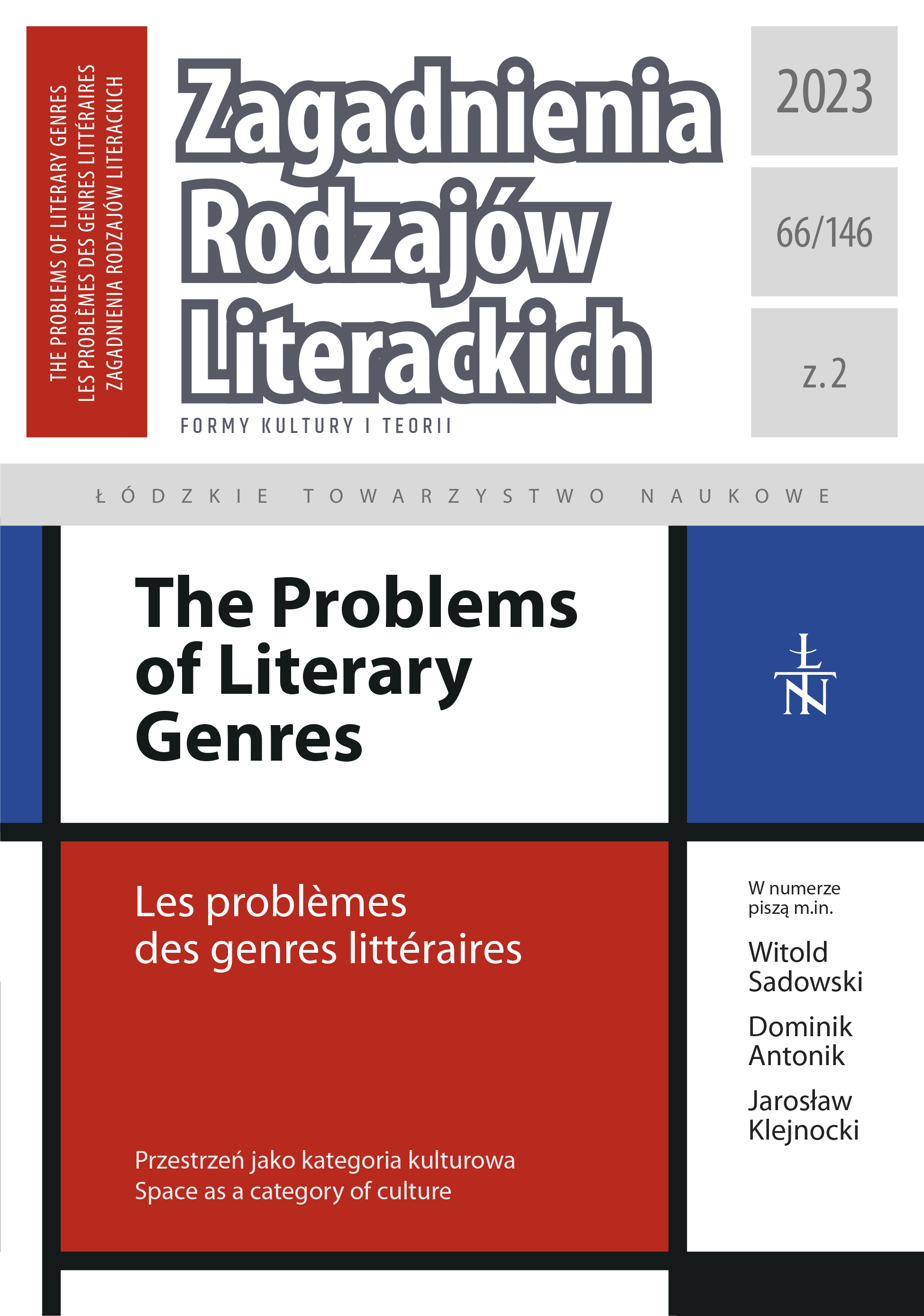Między przestrzenią Mediolanu a pamięcią poetycką. Rozważania na marginesie włoskiej poezji współczesnej
DOI:
https://doi.org/10.26485/ZRL/2023/66.2/8Słowa kluczowe:
Milan; emptiness; time; memory; dialogueAbstrakt
In contemporary Italian poetry, the strong presence of things intertwines with the recognition of emptiness. Poets, freed from the excess of history, rebuild their relationship with reality. They discover the depth of things and their real duration. At the same time, they try to find their own identity. A strong interdependence between the subject and the space takes a particular form in the works of poets associated with Milan, such as Vittorio Sereni or Milo De Angelis. They construct poetic imagery through liminal spaces and overlapping visions. Their poetic chronotope does not belong to the linear development of history. Starting from these observations, we aim to understand Milan’s character revealed by contemporary poetry. The dominance of non-places, indicated by Marc Augé, is contrasted in the paper with traditional spatial practices, such as wandering around the streets, where, as in Barthes: “the city speaks to its inhabitants, we speak our city, simply by inhabiting it, by traversing it, by looking at it.” This approach finally leads us to see the poetic space from the microhistory perspective and through the aura phenomenon.
Liczba pobrań
Bibliografia
Affinati Eraldo (1996), Patto giurato. La poesia di Milo De Angelis, Tracce, Pescara.
Antropologia pamięci. Zagadnienia i wybor tekstow (2018), red. P. Majewski, M. Napiórkowski, Wydawnictwa Uniwersytetu Warszawskiego, Warszawa.
Augé Marc (2010), Nie-miejsca: wprowadzenie do antropologii hipernowoczesności, przeł. R. Chymkowski, Wydawnictwo Naukowe PWN, Warszawa.
Bachtin Michaił (1974), Czas i przestrzeń w powieści, „Pamiętnik Literacki”, nr 65(4).
Bachtin Michaił (1986), Estetyka tworczości słownej, przeł. D. Ulicka, oprac. E. Czaplejewicz, Państwowy Instytut Wydawniczy, Warszawa.
Barthes Roland (1967), Semiologie et urbanisme [w:] R. Barthes, OEuvres completes (1994), t. 2 (1966–1973), Seuil, Paris.
Benjamin Walter (1970), O kilku motywach u Baudelaire’a, „Przegląd Humanistyczny”, nr 5/6.
Bergson Henri (2005), Ewolucja tworcza, przeł. F. Znaniecki, Zielona Sowa, Kraków.
Blanchot Maurice (1978), L’attesa, l’oblio, Guanda, Milano.
de Certeau Michel (2008), Wynaleźć codzienność. Sztuki działania, przeł. K. Thiel-Jańczuk, Wydawnictwo Uniwersytetu Jagiellońskiego, Kraków.
Cucchi Maurizio (2014), Intervista con Maurizio Cucchi, condotta da Francesco Filia, „Poetarum Silva”, 22 grudnia, https://poetarumsilva.com/2014/12/22/intervista-a-maurizio-cucchi [dostęp: 28.10.2023].
Cucchi Maurizio (2021), La traversata di Milano, Mondadori, Milano.
De Angelis Milo (2008), Colloqui sulla poesia, La Vita Felice, Milano.
De Angelis Milo (2017), Tutte le poesie. 1969–2015, Mondadori, Milano.
Galaverni Roberto (2002), Dopo la poesia. Saggi sui contemporanei, Fazi Editore, Roma.
Linea lombarda (1952), red. L. Anceschi, Magenta, Varese.
Loi Franco (2005), Aria de la memoria. Poesie scelte 1973–2002, Einaudi, Torino.
Neri Giampiero (2021), Piazza Libia, Edizioni Ares, Milano.
Pavese Cesare (1975), Dialogi z Leukoteą. Mit. Szkice literackie, przeł. S. Kasprzysiak, Czytelnik, Warszawa.
Sereni Vittorio (2020), Poesie e prose, Mondadori, Milano.
Sławek Tadeusz (2013), Być z przestrzenią, „Autoportret” nr 2(41).
Pobrania
Opublikowane
Jak cytować
Numer
Dział
Licencja
Prawa autorskie (c) 2023 Łódzkie Towarzystwo Naukowe i autorzy

Utwór dostępny jest na licencji Creative Commons Uznanie autorstwa 4.0 Międzynarodowe.







